Sophie Williams scoops up two large handfuls of malted rye grains and holds them out to me. The light green pods are about half an inch long with little sprouts coming out the end.
“They’re just so fat and beautiful,” she says.
This grain was grown in Lynden, milled in Burlington, and will go into the breads Williams bakes.
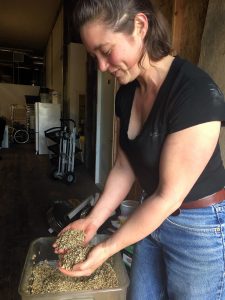
Sophie Williams opened Raven Breads in 2014—a one-person, bicycle-based bakery selling organic whole-grain and sourdough breads and pastries made from ingredients mostly grown in the Pacific Northwest. Despite being her only full-time employee and frequently clocking 14-hour baking days in a small, fluorescently lit shared kitchen on the second story of a State Street building, Williams has retained the commitment to sustainability and ecological responsibility that first brought her to baking five years ago.
“My primary goal is to make very good bread,” Williams says. “To make a staple food that is nutritious and keeps well and is satisfying. But being able to do that will locally milled grain—and to a greater and greater extent locally grown grain—is the ongoing goal of the business.”
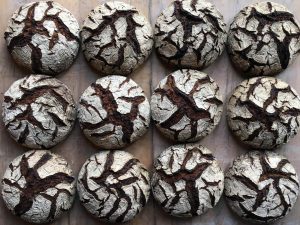
Williams currently sells her bread to Cafe Velo, the Bellingham Cider Company, Kismet Cafe, ANMLY Cafe, Makeworth Market and Hotel Bellwether. She also has a year-round bread subscription program, sells through the Viva Farms CSA program and has a weekly booth at the Bellingham Farmers Market.
Williams has been selling her bread at the downtown farmers market since she first opened, and has increased her sales 30 percent each year at the market. It’s a great part of her business, Williams says.
“It’s wonderful to stay plugged into the local farming community and to have those connections for sourcing ingredients,” she says.
Staying connected to the farming community is important to Williams, because in a way, she came to baking through farming. After graduating from college, Williams gave herself three years to decide if she wanted to be a farmer.
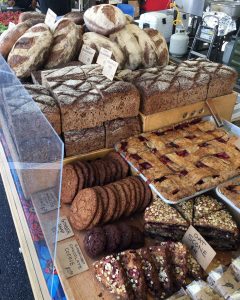
“At the end of those three years I didn’t want to be a farmer, but I knew that I wanted to keep working with my hands and keep working in the local food system,” she says.
Today, Williams credits her lack of a traditional baking background with allowing her to pursue an unconventional baking path. Traditional baker logic, Williams says, is that people want white bread, baguettes, ciabatta and fluffy pastries—none of which Williams makes. Tradition also suggests rye bread is a novelty item that you can maybe sell one loaf of a week. And yet, rye is the center of Williams’ retail business, she says.
Williams purchases all of her flour through Fairhaven Organic Flour Mill, located in Burlington. The mill contracts with local farmers, so the rye she uses is all grown in Lynden, the hard red wheat is from outside of Walla Walla, and the pastry wheat is also grown in Lynden.
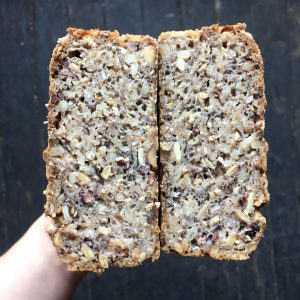
Williams makes all her breads in a small, commissary kitchen that butts up on Bird Alley, the alleyway between State Street and Railroad Avenue. After making the bread, she loads it all up on a trailer attached to her bike, and bikes the bread to each of the cafes and businesses with whom she works.
Like the locally sourced ingredients, Williams’ decision to deliver her bread by bike is an effort to support her commitment to sustainability wherever possible.
“I spend so much time thinking about the environmental impact of the ingredients that I’m putting in that it only makes sense I extend that to the entire business,” she says.
The move is also an effort to intentionally spend her resources. The economics of biking your bread are such that when you compare the labor cost of the time it takes to deliver by bike with the vehicle and maintenance costs of delivering by car or truck, it basically comes out evenly.
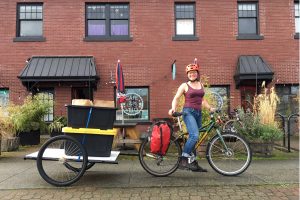
“In the balance of things, it makes so much more sense to put that money into people,” Williams says.
Five years after opening, Williams continues to grow her business and her baking knowledge.
Each winter that she has owned Raven Breads, Williams has taken between two and four weeks to visit another bakery or bakeries who are plugging in to their local food system in conscious and creative ways. One winter, she shipped her bike to South Carolina, walked from the airport to the FedEx store, put her bike back together and proceeded on a bike tour of bakeries in North Carolina to learn from the bakers and their local food scene.
In an effort to reduce the number of 14-hour-days she spends covered in flour, Williams just installed a second oven to her kitchen space. Looking ahead, she is planning to open a storefront for Raven Breads.
It’s an exciting time to be plugged into the small-scale bakery business, Williams says. As our food system was industrialized, a lot of the infrastructure that once supported small-scale grain cleaning and milling disappeared, but those systems are now gradually rebuilding.
When she opened five years ago, Williams was trying to fill a hole she perceived in Bellingham’s food network, and says it’s exciting to look around now and see those efforts becoming more mainstreamed.












































